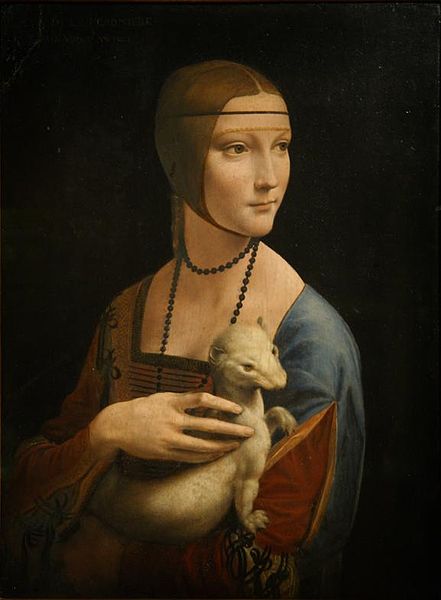| Lady with an Ermine | |
|---|---|
 |
|
| Artist | Leonardo da Vinci |
| Year | 1489-1490 |
| Medium | Oil on wood panel |
| Location | Czartoryski Museum, Kraków |
| Dimensions | 21 in × 15 in |
| 54 cm × 39 cm | |
| Famous Paintings by da Vinci | |
| The Last Supper | |
| Mona Lisa | |
| Vitruvian Man | |
| The Baptism of Christ | |
| Annunciation | |
| Lady with an Ermine | |
| Ginevra de’ Benci | |
| Adoration of the Magi | |
| St. Jerome in the Wilderness | |
| View Complete Works |
One of Leonardo da Vinci’s female portraits is the Lady with an Ermine which portrays an image of a woman identified to be Cecilia Gallerani who was the mistress of the Duke of Milan. Dated circa 1489 – 1490, this was the time when Leonardo da Vinci was under the service of Lodovico Sforza, the Duke of Milan.
The painting depicts Gallerani holding a weasel in its winter coat which is a portrayal of the sitter’s character as a chaste and wholesome lady. The ermine may also be a pun to Gallerani’s name since the Greek word used for the weasel is “galee”, a name to the family name of Cecilia “Gallerani”. Another meaning for the presence of the ermine may refer to the Duke himself who has a nickname of “Italian Moor, White Ermine” after receiving the insignia of the Order of the Ermine given by the King of Naples.
This Leonardo da Vinci painting was heavily done with oil on a 54.8 x 40.3 cm wooden panel. The portrait shows a darkened background. Retouches of the painting were made, one of which was the dress made to appear not as transparent as before to match the color of Gallerani’s hair color. Other retouches include the appearance of Gallerani’s hair to reaching down to the woman’s chin. An x-ray of the Lady of an Ermine has shown a painting of a door in the background.
There are some intrigues and speculations existing whether the painting was done by da Vinci, Boltraffio, or da Predis. The painting of Lady with an ermine was bought in Italy by the Prince Adam Czartoryski during one of his tours. He added the painting to the Czartoryski Family collection in 1800. The painting now sits in the Czartoryski Museum in Krakow, Poland but is currently touring museums abroad since the Princes Czartoryski Musem is under renovation which started in 2010. The painting is expected to be back in Krakow by 2012.